#arnites
Explore tagged Tumblr posts
Text
Hill Top School Awarded "Golden School" Title by Indian Talent Olympiad Group
Hill Top School receives prestigious national recognition, celebrating academic excellence and student achievements. Hill Top School has been honored with the esteemed “Golden School” title at the national level by the Indian Talent Olympiad Group, marking a significant milestone in its pursuit of academic excellence. JAMSHEDPUR – Hill Top School has received the esteemed “Golden School” title…
#Academic Excellence#Arnit Ghosh#शिक्षा#community support#education#education award#Golden School title#Hill Top School#Indian Talent Olympiad#Jamshedpur#National Recognition#Student Achievement
0 notes
Text
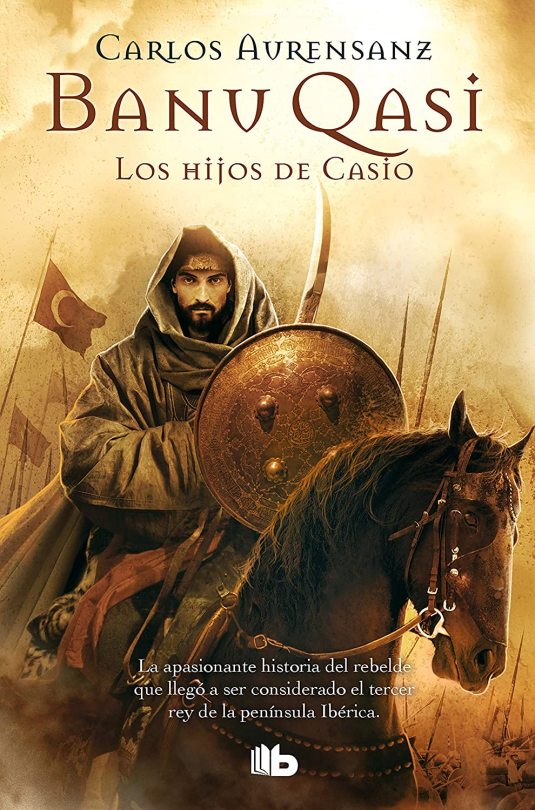
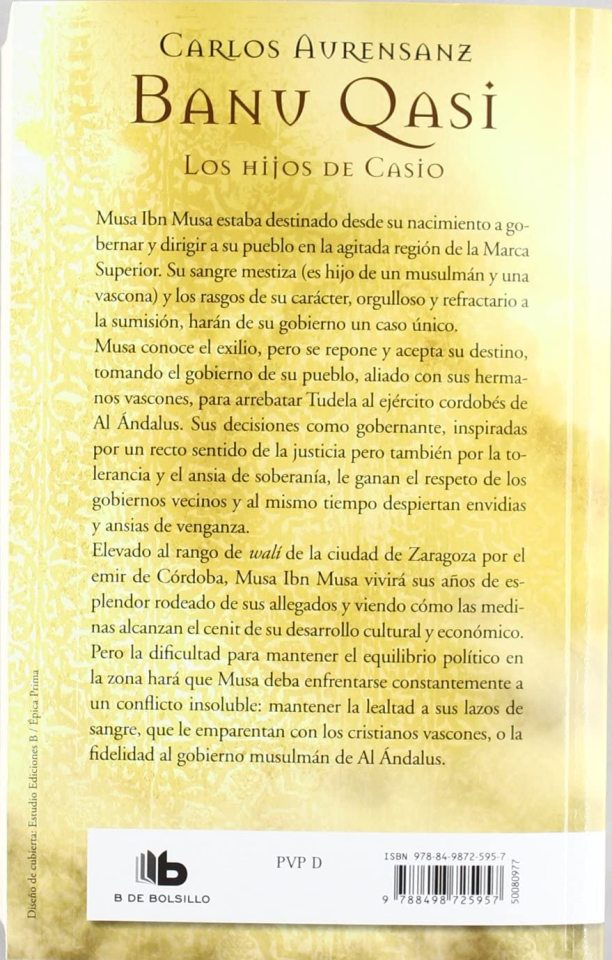
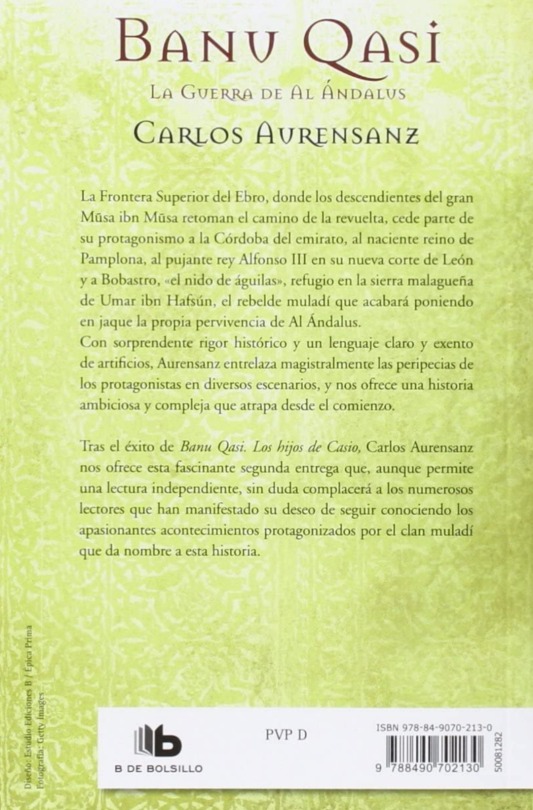
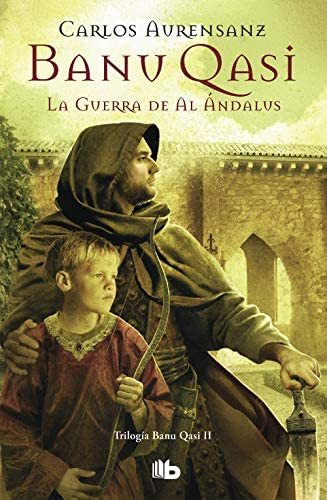

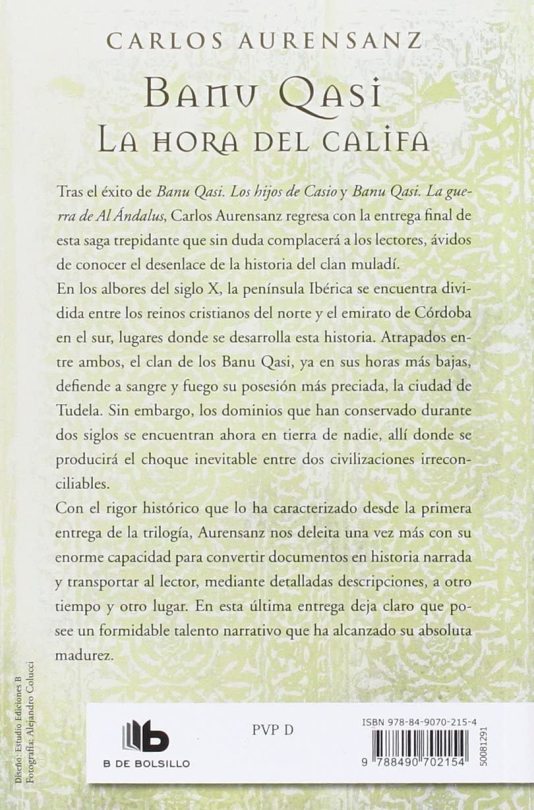
@asongofstarkandtargaryen There's a triology I recently discovered that I want to read. It's the Banu Qasi triology writtenby Carlos Aurensanz, about the Banu Qasi and Iñiga-Aritza/Jimena families and their surroundings. The books can be downloaded on Internet (I have added the links for the download of each on of the books in esch of the titles if anyone wants to read them)
I. Los Hijos de Casio, 2009 (The Children of Casio)
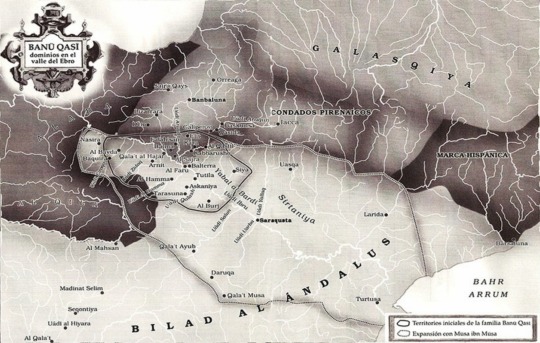
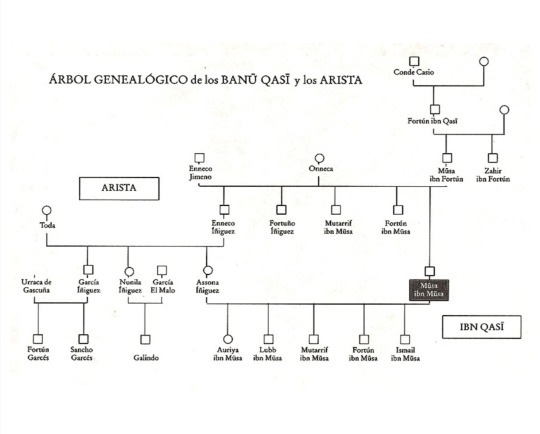
"The exciting story of the rebel who came to be considered the third king of the Iberian Peninsula"
Musa Ibn Musa was destined from birth to rule and lead his people in the troubled region of the Upper March. His mixed blood (he is the son of a Muslim and a Basque woman) and the traits of his character, proud and refractory to submission, will make his government a unique case.
Musa knows exile, but he recovers and accepts his destiny, taking over the government of his people, a consubstantial ally of his Basque brothers, to seize Tudela from the Cordovan army of Al Ándalus. His decisions as ruler, inspired by a correct sense of justice but also by tolerance and a desire for sovereignty, earn him the respect of neighboring governments and at the same time arouse envy and a desire for revenge.
Elevated to the rank of wali of the city of Zaragoza by the Emir of Córdoba, Musa ibn Musa will live out his years of splendor surrounded by his relatives and seeing how the medinas reach their zenith of their cultural and economic development. But the difficulty in maintaining the political balance in the area will mean that Musa must constantly face an insoluble conflict: maintaining loyalty to his blood ties, which related him to the Basque Christians, or loyalty to the Muslim government of Al Ándalus.
Sample: Year 788, 171 of Hegira. Onneca was breathing heavily, clinging to both edges of the wooden bed, while the kabila leaned over her to speak to her in a calm but forceful voice. His hands, hidden under the folds of a rough linen sheet, revealed determined and precise movements: not in vain had the most experienced midwife in the region been notified. Every few minutes, the woman's face contorted in pain, her knuckles turning white as she felt the contractions. The midwife had ordered a table with two basins of clean, hot water and several cloths to be set up next to the bed. She herself had protected herself with an apron that covered her to her feet.
From time to time she inserted her fingers into a cylindrical clay container that contained a dark and oily substance, and continued his maneuvers. Meanwhile, two maids struggled to carry out his orders, trying tohide their fear and nervousness. They had tried to heat the bedroom with two metal braziers that were replaced periodically, but the wind slipped through the thick curtains that blocked the view from the central patio of the house, in the citadel of Arnit. Zahir ibn Fortun waited impatiently. The woman who was about to give birth in the next room was the widow of his brother, who had died three months ago in Saraqusta. Though she tried to put the tragic moment when the news was delivered from her mind, the memory fought to come back, and a familiar feeling of anguish clenched her stomach. His brother, Mūsa ibn Fortún, had been called to Saraqusta to put down the rebellion that had arisen in the city after the accession to the throne of Qurtuba of Emir Hisham I, led by Said al Husayn. Mūsa managed to master thethe revolt after getting rid of the ringleader, and took control of the city, although he had to remain in it to ensure stability. The danger seemed to have been passed, and Saraqusta returned to her calm. But after three weeks, a freedman from the rebel Said assaulted Mūsa as he left the mosque after Friday prayers and pierced his heart with a dagger, without his guard being able to do anything to stop him. At that very moment, Zahir was unable to push away the image of his lifeless brother, because in the next room the last son of Mūsa came into the world, an orphan.
Onneca was a strong woman, like all of her Basque race, originally from the Pyrenean valleys. She had married Mūsa for the second time, after the death of her first husband, the Basque leader Enneco Jimeno, with whom she had had her first two children: Enneco and Fortuño, who were already eighteen and seventeen years old. After Jimeno's death, Onneca moved to Arnit with her new husband, but her children remained in their native valley, to grow up in contact with the town that one day they were destined to lead. Although the separation was painful for Onneca, he was aware of the important role that the men of his lineage had played among the Basques for generations.
Hearing the sounds from the next room, Zahir's thoughts returned to Onneca, widowed for the second time and about to give birth to a son who would never know his father. The voices of the kabila became imperious, confused with the moans of the mother. For a moment there was silence, broken at last by the crying of a child. The midwife had cut the umbilical cord and opened the child's orifices with her fingers. Then she began to wash it, while the mother watched from the bed. The kabila was an experienced woman, and she knew that that blank stare was caused by the exhaustion of childbirth. But in the case of Onneca something else was guessed: a sadness that arose from the depths. The midwife took long strips of linen that she had ordered the maids to cut, and began to wrap the small body, swaddling it until it was practically immobilized. Then she lifted the newborn in her arms and brought him closer to the bed, inviting the mother to take him into her lap. For a moment Onneca seemed not to understand, but finally she reached out her hands and settled the child against her chest. "A precious child, strong, healthy and well formed," said the kabila. "Like his father," Onneca answered with a small voice.
The midwife pretended not to notice the tears that slipped down the mother's face and continued with an animated voice: —Now I'm going to finish you off, we'll clean all this up and let you rest. I have chosen a trustworthy nurse who will be there when you arrive and will take care of the little one.
Onneca nodded slowly and let the woman do it, who took the child again and placed it carefully in a small wicker cradle prepared next to the bed. Finished with her work, she allowed the two maids, calmer now, to take care of removing the bedclothes. "It's the cradle that all my children have used," Onneca said in a whisper to the girls, outlining a smile. Zahir jumped to his feet as the door to the next room opened. He had no experience as a father, because his only marriage had not been blessed with the arrival of children. His wife had died years ago, and he hadn't taken another, so the birth he'd just attended was the closest thing to parenthood he'd ever experienced. The midwife, who was leaving the house, informed her: it had been a boy, and both mother and son were fine. He turned his head in the direction of the Qibla and gave thanks to Allah. "The mother wants to see you, and I must say goodbye." Do not hesitate to send a message if any setback arises. "We won't hesitate," he replied, at the same time he deposited a small leather bag in her hand. We appreciate the work you have done. Zahir entered the bedroom, and looked at his brother's wife, who opened her eyes when she felt his presence. The man approached the bed, and Onneca took his hand. "He is a child, whole and healthy," she announced. "I know, Onneca. At least this has gone according to your wishes. Onneca nodded gently, though her eyes had blundered again. "Now that the child is here, you must put into practice everything we have planned together." My children…” “Rest now,” Zahir interrupted. Time will have to take care of that when you recover. "Just one thing: I've thought about the name I'm going to give the child." His name will be Mūsa, like his father: Mūsa, son of Mūsa. “Sounds good, Mūsa ibn Mūsa…” “You know? I have a good feeling,” he confided. I'm sure he's going to do great things. It's not easy for me to explain it, but it's as if a star had gone out in our lives and with it another one lit up. Zahir agreed withwith a smile and, sitting on the edge of the bed, he squeezed the woman's hand until he noticed that her breathing became regular and slow. Then he got up carefully and left the bedroom.
He entered the room where Mutarrif was waiting and found the boy sitting on the stone bench near the fire, his eyes lost in the flames that heated the room. Noticing his uncle's presence, he gave him a questioning look, but managed to hold his ground in an effort to hide the uneasiness he felt. Zahir saw the worry in his too-bright eyes and smiled reassuringly before speaking, “Everything went well, Mutarrif. You have a new brother... a boy. Your mother is well, although very tired. The boy nodded and smiled but remained silent. His uncle sat next to him. On the bench on the opposite wall, little Fortún was sleeping soundly, judging by his regular breathing. The two brothers usually slept there, on light mattresses stuffed with straw that served as seats during the day. "Your mother is resting now, but tomorrow you can see both of them." -Thank you. Zahir leaned forward to rest her elbows on her knees, her hands cupping her face as she suppressed a slight yawn. The day had been long and exhausting. "Mutarrif," he said, sitting up, "I want you to know that I've been talking to your mother...The last few months have been very hard on you and your siblings, I know. Your father's death has affected all of us greatly. He paused to take a deep breath, calculating how to continue, "You are fourteen now, Mutarrif, almost a man, and now we must face the future." Allah Almighty has allowed the death of my brother, but in his mercy he has only wanted it to happen when you and Fortún are not children anymore. The boy made a gesture that indicated that this did not comfort him too much. “I have promised your mother,” Zahir continued, “that I will take care of you as long as it is necessary. Not only in terms of your maintenance, which we have secured due to the position we occupy, Allah be praised! What should concern us the most from now on is your training. As I know my brother had in mind, you must devote all your effort to study and training in the military. My father had already discussed it with me.
He wanted me to start accompanying him on some of his expeditions. He just had to wait until he was fifteen. Zahir noted the effort the boy was making to keep his voice steady. 'Yes, I suppose so, Mutarrif. However, we will have to modify those plans somewhat. I know your taste for the militia, and I have arranged with the officers of the garrison your transfer to their dependencies. You will live with them while you are introduced to the use of weapons and military arts. For a moment Mutarrif's face lit up. "But you must not neglect your learning at the mosque school with the other boys your age." I don't mean to scare you, but the imām is ready to work hard for you,” he said in a nonchalant tone, trying to break the tension. "I have to learn to ride well." My father said that to be a good army general you have to know how to handle weapons on horseback. "Ah, I think I can help you with that, it's my specialty," he replied briskly. This time Mutarrif looked at his uncle and smiled slightly. A moment later they had melted into an embrace. "Don't worry, boy… it's going to be all right," Zahir managed to say. We are going to understand each other.
Year 799, 183 of Hijra. The instability in Saraqusta continued after the death of Mūsa ibn Fortún. Revolts and attempts to seize power by different Arab factions followed one another, and the emir of Qurtuba, Hisham I, was forced to send his armies to quell the riots in what was considered the most important square in Uādi Ibru.
However, Saraqusta was not the only problem that kept Emir Hisham I busy. Since his accession to the Cordovan throne, he had had to face rebellions within Al Ándalus itself, in addition to successive campaigns against the northern border territories. His father, Abd al Rahman I, the first Emir of Qurtuba, had had three sons, but had not appointed his eldest son, Sulayman, to succeed him, but rather the second son, Hisham. At the time of the emir's death, Hisham, who was in Marida, hurried back to Qurtuba to take possession of the throne, but when Sulayman heard of his brother's proclamation, he rose up in arms and set out to conquer. of Qurtuba. The third brother, Abd Allah, who had not welcomed Hisham's elevation to the emirate, joined the eldest. Thus, one of the emir's first tasks was to fight for the throne against his two brothers. He had to mobilize the army to repel Sulayman's attack and encircle Tulaytula. After a year of conflict, the two brothers offered submission to Hisham and, after receiving from him seventy thousand gold dinars, went into exile in the Maghreb. The support given by the Banū Qasī family to the emir in Saraqusta, which had cost Mūsa ibn Fortún his life, was not forgotten. Mutarrif had just turned twenty-one when he was summoned to the capital by the governor of the march. Since his father's death, the boy, along with his brother Fortún, had dedicated every minute of their time preparing to assume the leadership of the family that would one day correspond to him, under the control and support of his uncle Zahir. When Mutarrif set out from Arnit in the direction of Saraqusta, following the route that skirted the river, little did he know the reason for the call. Eighty years ago, when the Muslims reached the lands of the Ibru under the command of Tariq, they were under the rule of Mutarrif's great-grandfather, the Visigothic count Casio, who did not hesitate to sign a pact with the newcomers and become the caliph's maula of Damascus. But the leaders of Banbaluna, as in many other Visigothic cities, opted for a different relationship: they maintained their control of the area in exchange for an annual tribute for the Qurtuba coffers. Non-payment of said tribute was a frequent reason for the emir's armed intervention, as had happened precisely in Banbaluna, which was under the control of the Baskunish, whose leaders dominated the area of the western Pyrenees.
A new attempt to break away from the commitment had forced the governor of the March to intervene, and to guarantee the continuity in the payment of the tribute, he decided to leave a wālī at the head of the garrison representing the power of Qurtuba. The interview at Saraqusta was brief, for the governor was not a man of many words. He exchanged proper greetings with Mutarrif and praised his father's role. Precisely in recognition of this role of the Banū Qasī, he said, he had decided to call the young muladí to his presence: he would be the new worth of Banbaluna. He had to move to the city without wasting time and assume his new duties. After being informed by a high official of the details of the situation in the land of the Basques, and after receiving the appropriate instructions, Mutarrif left Saraqusta at the head of a large entourage. Since then, four years had passed in which things had changed a lot for the Banū Qasī.
After Mutarrif's departure, Fortún had grown into a strong and proud young man who had managed to earn the respect and consideration of his comrades in arms in the Arnit garrison. Gradually, he had seen how all the inhabitants of the area recognized his condition as a natural leader, just as it had happened with his father and before with his grandfather. Mutarrif had been at the helm of the Banbaluna government for a year when news of Hisham I's untimely death arrived in Qurtuba, who had been succeeded to the throne by his son Al Hakam I, who was only twenty-six years old. Since Mutarrif arrived in the city, relations had been strengthened with his brothers on the mother's side, Enneco and Fortuño, who were still on their lands in the Pyrenean valley of Salazar, two days away.
On several occasions Zahir had accompanied Onneca there to visit her older children. Little Mūsa traveled enthusiastically, eager to see his stepbrothers again, for whom he professed boundless admiration. During the first years of Mūsa's life, the stays in Isaba, where Enneco had his residence, were rather short, and they were limited to the summer season, when the good weather allowed the boy to enjoy playing in the green and endless meadows, bathe in the icy waters of the river, scare the sheep and milk the cows. However, over the years, the visits were prolonged, and Mūsa began to spend some time in the care of his brothers, especially the eldest son, who was amused by the little one's bright and spontaneous character and allowed him to share some of his memories with him. activities. During those summers, Enneco became the father Mūsa had never known. There were also many occasions when Fortún, from Arnit, went to visit his brother Mutarrif in Banbaluna. Zahir attended these interviews with satisfaction, and felt proud of these two young people in their early twenties who, perhaps forced by circumstances, acted with a maturity almost beyond their age. In such meetings they dealt with the political situation in the area, mainly in Saraqusta, where instability once again reigned. But the situation was not calm in Banbaluna either: a large group of Pamploneses, led by Balask al Yalaski, opposed the emir's authority over the city, and some attempts at confrontation had arisen. News reached Mutarrif that Balask and his followers were in favor of establishing relations with Charlemagne, the Carolingian monarch whose vast territory extended beyond the Pyrenees. The two brothers knew that the leadership role of their family in the lands of Uādi Ibru, after the hiatus imposed by the death of their father, would sooner or later lead them to intervene in the events that were taking place in the March, mainly in Saraqusta.
For this reason, according to Zahir, both decided to leave Arnit and move with the bulk of the military garrison to Tutila, located a shorter distance from Saraqusta and better communicated. Tutila was then a small town located at the confluence of the Uādi Qalash with the Uādi Ibru, at the foot of an elevation crowned by a modest defensive fortress. The existence of a bridge over the mighty riverbed made the enclave a strategic point in communications throughout the valley. Many of its inhabitants still recounted to the younger ones the passage through the city, twenty years ago, of the imposing army of Charlemagne on his return from Saraqusta, on the way to Roncesvalles.
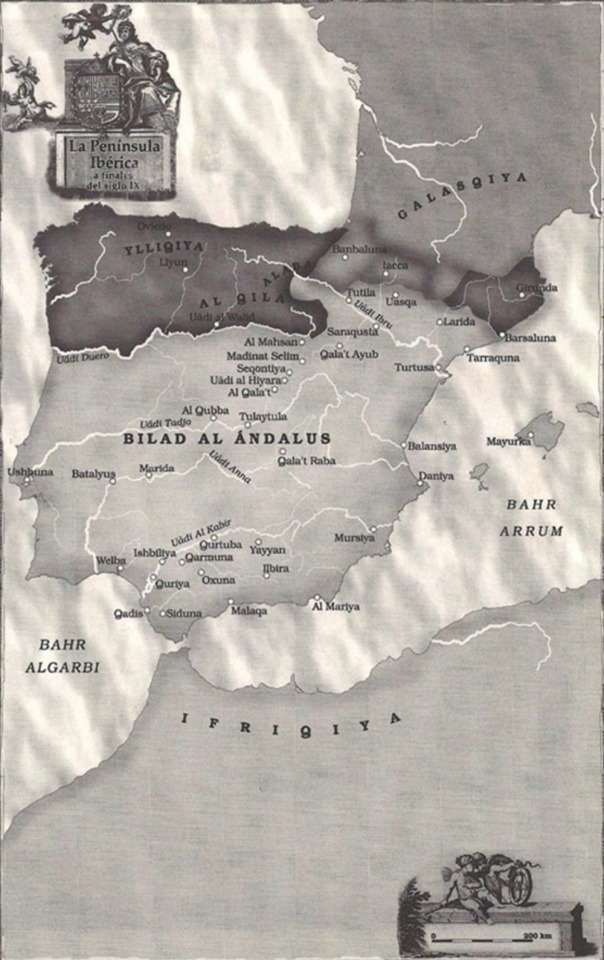
II. La Guerra de Al Ándalus, 2013 (The War of Al Andalus)
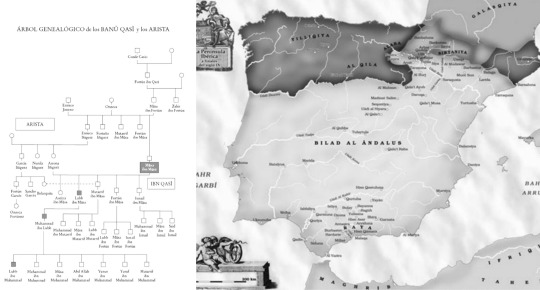
The Upper Border of the Ebro, where the descendants of the great Mūsa ibn Mūsa resumed the path of revolt, ceded part of its leadership to the emirate's Córdoba, the nascent kingdom of Pamplona, the mighty King Alfonso III in his new court in León and Bobastro, "the eagle's nest", refuge in the Malaga mountains of Umar ibn Hafsún, the muladí rebel who would end up jeopardizing the very survival of Al Ándalus. With surprising historical rigor and clear language free of artifice, Aurensanz masterfully intertwines the adventures of the protagonists in this diversity of settings, and offers an ambitious and complex story that will once again captivate the reader.
Fascinating second part of the saga already started with Banu Qasi: Los hijos de Casio that takes up the narration of the events carried out by the muladí clan that gives its name to this story.
Sample: Year 863, Hegira 249, Qurtuba. Sunset was undoubtedly the time of day that Onneca preferred. Although this was the third summer that she would spend in the capital, she had not managed to get used to the intense heat of the Córdoba summer and, if he missed something from his native land, there in the north, in Basque lands, it was the sunny but cool days of the mountains, which allowed him to maintain activity even during the hottest hours of midday. Not so in Qurtuba, of course. When the sun reached its zenith, both she and Fortún, her father, used to already find themselves sheltering in their comfortable rooms in the Dar al Rahn, the magnificent building destined to house the numerous political hostages of the emirate. The House of Hostages occupied a privileged space between the aljama mosque and the wall that separated the madinat from Uādi al Kabir. The main access to the building was next to the Puerta del Puente, a place of continuous movement of people and merchandise that delighted the young Onneca. At fifteen, she was a jovial and alert girl, in her father's opinion perhaps too much for a society like that, in which women had perfectly defined limits that they should not cross. The first weeks of his stay in Qurtuba had been hard: he still kept on his retina the images of the destruction of Pampilona and all the Basque villages that Muhammad I's army had had devastated in its path. She remembered her anxiety during the negotiation in which Fortún had to agree to be transferred to the capital as a hostage, and how she threw herself at her father's feet to beg him to take her with him. Those images returned to her again and again wrapped in a cloud of unreality, which lasted in the three interminable weeks that they used to cross the entire territory of Al Ándalus from north to south. Three years. Only three years, but for Onneca it seemed like an entire existence had passed. In Qurtuba she had discovered a completely new way of life, of which she had only had references through the stories of her Muslim relatives from the Ebro. But then she was a girl, and for her all those stories of emirs and concubines, lavish palaces and enormous mosques they did not differ at all from the rest of the stories they used to hear during the cold nights in old Pampilona, comforted by the warmth of the fire.
Their treatment from day one had come as a surprise to both her father and her. Even during their transfer, they had been provided with unthinkable comforts in the rear of a huge army such as that of Muhammad I. It is true that the haymah they occupied during short nightly rests was permanently guarded by four members of the emir's personal guard, but the The mounts they rode on were excellent, the food they were offered was more than dignified, and they did not lack a pitcher of fresh water while they crossed the endless plains of the center of the Peninsula.
With her mother dead, the separation from her father, whom she adored, would have been unbearable. Having him by her side, being able to accompany him during his captivity, had made her feel strangely lucky from the start. The House of Hostages was a spacious and well-preserved two-story building whose rooms opened onto a patio that even had a singing fountain in the center. Fortún and Onneca occupied a lodging made up of three rooms attached to the southern wall, a location that allowed it to receive the first rays of the morning sun and kept it in the shade during the hot hours of the afternoon. The girl was one of the few women who lived in the building, whose inhabitants were mostly men, younger than old, belonging mostly to part to lineages of high birth.
Despite the diversity of origins and religions, the captivity had established strong bonds of friendship between them, and they had adopted the lively Basque as the daughter or sister that everyone would have wanted by their side. From the beginning, Onneca had worked hard to make her father's life as easy as possible. He would get up at dawn, to devote the coolest hours of the day to domestic chores that might involve some effort, and before the sun warmed they would go out together to the nearby market, where they would be greeted by the familiar bustle that so pleased him. At that early hour, the stalls were overflowing with merchandise from the nearby orchards and farms, and soon the basket that hung from her arm contained what was necessary to supply the small pantry. In In recent months, the person in charge of carrying that load had been Abdel.
In the first interview they had with the chamberlain, they were offered the possibility of having one or two slaves to attend to their needs, and Fortún was grateful and willing to accept the proposal. As soon as they were alone, however, Onneca made another suggestion to her father. She would take care of the simple household chores, and in return Fortún would ask for something on the quarterdeck. Ever since she learned her fate, Onneca had decided not to waste time during her captivity, and the first goal she set for herself was to speak the Arabic language correctly. Although it was true that he already knew its rudiments, thanks to contact with his relatives and with the many Muslim merchants who visited Pampilona, he did not intend to miss the opportunity offered by his forced stay in that splendid city, the capital of the emirate. But he needed someone with enough knowledge at his side.
Abdel entered the Dar al Rahn only two weeks after Onneca's arrival. He was a seventeen-year-old boy, tall, thin, and dark-haired, whose gaze barely lifted from the ground, and whose company became habitual since he introduced himself to both of them with a low voice. Every day, in the hottest hours, Fortún retired to his bedroom, and it was not surprising that he fell asleep hearing his daughter repeat old Arabic sentences over and over again, occasionally corrected by the masculine voice of her young teacher. Little by little, his visits became more frequent and extended to the central hours of the morning. With a studied gesture of surprise, He would pretend to bump into Onneca in the market, offer to carry her basket, and accompany her to the House of Hostages. Once there, they both looked for any excuse to prolong the meeting, and with Fortún's acquiescence, the boy ended up accompanying them in their frugal lunch, before beginning the daily lessons. In the middle of the afternoon, after a brief rest, Fortún would return to make an appearance in the spacious room, and then Abdel would get up and with a slight bow he would say goodbye to both of them. That was the moment when Fortún, taking advantage of the shadow of the buildings and without ceasing to admire the superb southern wall of the main mosque, used to cross the square in the direction of the fortress.
He had discovered what for him it constituted the greatest treasure in the palace of Muhammad, a treasure of which he had already had complete news through the abbot of Leyre, there in the distant foothills of the Pyrenees: the magnificent library of the fortress housed thousands of volumes, and a part nothing insignificant of these was translated into Latin. It had not cost him any effort to obtain the necessary permits to access its premises, and in those years he had established a relationship of frank friendship with the senior official to whom the emir personally delegated his authority as responsible for the conservation and expansion of that center of knowing. Although the hours for Fortún passed quickly there, his desire to enjoy his daughter's company did not diminish, so he soon began to borrow scrolls and volumes with which to fill his time without having to leave the Dar al Rahn. His Christian faith had taken root firmly under the influence of both his father and the Bishop of Pampilona, Willesindo, confessor and friend of the family, so his first readings had been directed to the works of the fathers of the Church, who with great surprise had found in those immense shelves. There he had discovered De civitate Dei, by Agustín of Hipona, and had even had the opportunity to enjoy some of the twenty volumes of the Etymologies of the old bishop of Ishbiliya, Isidoro. The deep meditations of the old masters were a balm for him, as they somehow compensated for the impossibility of practicing worship in the city's churches, something that the sovereign had prohibited at the beginning of his reign, after the serious events carried out by christian martyrs who, led by Bishop Eulogio, had defied the religious laws of the emirate until they ended up executed. That afternoon at the end of summer, in the middle of the month of Rajab, the city was abuzz with rumors, as the return of the victorious Cordovan army, under the command of Prince Abd al Rahman, was imminent. Apparently, Alaba's campaign against King Ordoño of Asturias had been a real success. No inhabitant of Qurtuba expected anything different, since, last spring, they had seen with their own eyes the enormous display of men from all the groups of southern Al Ándalus who had gathered on foot and on horseback on the esplanade of the musara, ready to leave. The narrators who walked the streets and squares of Qurtuba spared no praise for a sovereign that had led them to a new victory against the infidels of the north: twenty Christian counts had bitten the dust according to the stories that circulated by word of mouth, and King Ordoño's own brother had been killed during the battle. Onneca had expressed concern about the fate of her relatives, but Fortún was able to reassure her after confirming in the fortress that on this occasion the people of Pamplona had not taken part in the conflict. Undoubtedly the vanguard of the army was approaching the city, for the Bab al Qantara, the nearest gate to the river, was wide open, and a high-ranking procession from the quarterdeck was heading towards it flanked by the crowd, there was also expectation in the Dar al Rahn.
The men were preparing to leave, and Onneca, after trying to glimpse something of what was happening outside above their shoulders and heads, headed determinedly to her lodging, where she found Fortún devoted to reading a heavy volume. "Father, the army is coming!" They are already coming out to receive them. Fortún looked up and regarded the girl with a slight smile. "Ah, youth…" he said with a sigh. You want to go out and you want me to come with you…” “Perhaps it won't be necessary, Father. Abdel can do it, he's still by the door, I can see him from here. Fortun studied the pages before him. - Be it, my daughter. However, you must not go far from the building. And be back before nightfall. Onneca's face lit up, she kissed her father on the cheek and left the room, hiding her hair under a light scarf. He ran across the courtyard, not giving much thought to the decorum that a girl of her position was supposed to hold, she slipped through the people grouped under the lintel of the gate and, once outside, looked around for Abdel. He did not find it immediately, since the boy did not count on his presence and had tried to approach the entourage, but due to his height his head stood out above the rest. Onneca managed to almost push his way through, and laughed heartily at the shocked face of the young man as he stood beside him. "Onneca!" You should have warned me! It's not safe for a girl…” “Shhh! he snapped. Who are they? he asked, his eyes fixed on the two superb horsemen approaching from the opposite end of the esplanade. “They are the sons of Muhammad. The first is the crown prince, Al Mundhir. The one who advances behind the guard is Abd Allah.
No doubt they are going to receive their brother Prince Abd al Rahman right here, who is returning to lead the troops. —How can they be brothers being so different? Al Mundhir is dark and has curly hair, but look at Abd Allah: his skin is fair, his hair is blond... and those blue eyes. 'Both are sons of the emir, but certainly conceived by different wives. I understand they were born the same year. But Abd Allah is much more like his father. "How many children does Muhammad have?" Onneka asked. —At least twenty males and fifteen females... But look at their clothes, and their mounts... they are magnificent! "Let's get closer," Onneca said as she tried to push through, curious. The crowd barely allowed us to walk. Whole families went to the streets to see the heirs to the throne up close, a spectacle that was not repeated often. Onneca advanced sideways and, at the cost of enduring some complaints, made a place for herself in the front row, next to a woman with a young child who was looking at the procession with astonished eyes. Al Mundhir was passing in front of them, and Onneca took in his face, beautiful but pockmarked. He also observed that a dog was running naturally among the riders, as if wanting to take part in the party. The boy also saw it and separated from his mother to approach him, but the animal backed away in fear, until it was just a few elbows from Abd Allah's horse, which was waving to the crowd gathered on the sides. Onneca sensed the danger immediately. The mount reared, raising its front legs into the air.
The mother gave a warning cry, but it was Onneca who rushed towards the little boy, took his arm and, with a jerk that landed both on the ground, prevented the horse's hooves from crushing his body at the last moment. tiny. When the boy was already cared for by his mother and Abdel was advancing towards her, the girl looked up and discovered that the prince was trying to control his mount without taking his blue eyes from her face. The scarf that covered her head had fallen off, and she suddenly felt exposed to all eyes. Unable to control the situation, he pushed through the crowd and disappeared in the direction of the Hostage House. Abdel tried to follow her, but a voice behind him stopped him. -You! Do you know the girl? asked Abd Allah gravely. Abdel stopped and adjusted his posture to address the prince respectfully. “I know her, my lord. It is the daughter of one of your guests, Fortún, heir to the kingdom of Banbaluna. He is staying with his father at the Dar al Rahn, and I myself have been assigned to improve his knowledge of our language. The prince narrowed his eyes and seemed to smile. He waved the boy away with one hand, so Abdel, with a slight nod, stepped back to follow Onneca's steps. He had to report on the conversation he had just had. When a footman from the keep entered the Dar al Rahn's quarters the next morning with a scroll in his hand, Fortune took it with a trembling hand. He was sure he knew its contents.
III. La Hora del Califa, 2015 (The hour of the khalifa)
At the dawn of the 10th century, the Iberian Peninsula was divided between the Christian kingdoms in the north and the emirate of Córdoba in the south, places where this story takes place. Caught between the two, the Banu Qasī clan, already in low hours, defends with blood and fire their most precious possession, the city of Tudela. However, the domains they have held for two centuries now find themselves in no man's land, where the inevitable clash between two irreconcilable civilizations will take place. With the historical rigor that has characterized him since the first installment of the trilogy, Aurensanz delights us once again with his enormous ability to turn documents into a narrated story and transport the reader, through detailed descriptions, to another time and another place. In this latest installment, he makes it clear that he has a formidable narrative talent that seems to have reached its absolute maturity.
Sample: The emir remained standing in the middle of the silence, broken only by the whistling of the wind through the branches and the screeches of the birds of prey that flew over the cliffs, until he looked back at his son and, with a gesture, asked him to it will come closer. “Remember while you live this moment, Al Hakam. The road to get here is drenched in the blood of tens of thousands of good believers. Fifty years and the tenacity of four emirs have been necessary to break the resistance of this nest of perdition. When I was born, the Umayyad state as you have known it, the same one that seems so immutable to you now, was about to give up under the pressure of the rebels who had their refuge in this place. You know, because I have told you, that the chief who governed in Burbaster came to set fire with his projectiles in the aljama mosque of Qurtuba. The efforts of many men have been necessary so that you and I can tread these paths. Open your eyes and ears wide, because the stories you are going to hear and what you are going to experience in these days are the foundations on which we have to build the future of our dynasty. Today is the first day, listen to me carefully, of a new era for the Umayyads. A day that has taken longer to arrive than the person responsible for all this could ever suppose
Characters II Locations II Words & Etymologies
#banu qasi#books#banu qasi triology#los hijos de casio#la guerra de al ándalus#la hora del califa#carlos aurensanz#long post#historical fiction
6 notes
·
View notes
Text


' Tree list Chart " by Arnit Naskar
ℂ𝕙𝕒𝕣𝕥 𝕃𝕚𝕤𝕥 𝕄𝕒𝕜𝕚𝕟𝕘 𝕎𝕠𝕣𝕜𝕤𝕙𝕠𝕡
Power by রূপকলা Rupkala
🅃🄸🅃🄻🄴 : Tree list chart
🅂🄸🅉🄴 : ( 30 x 18 ) inch
🅂🅃🅄🄳🄴🄽🅃❜🅂 🄽🄰🄼🄴 : Arnit Naskar
🄲🄻🄰🅂🅂 : KID 4
🅂🅄🄱🄹🄴🄲🅃 : Craft
🅆🄾🅁🄺🄸🄽🄶 🅃🄸🄼🄴 : 90 munites per 2 days.
🅂🄴🅂🅂🄸🄾🄽 : ( 2023 - 2024 )
This is the activities base education ( workshop ) for KIDS. Thank you for viewings! Hope you enjoy this craft. If you want more like this please follow this page and don't forget to share post.
For business inquiries, please contact us...
At Official No : +91 070011 91527
Email - [email protected]
Thanks & God bless.🙏
#arteducation #artschool #crafts #chartmaker #colourschart #workshop #rupkala #colour #kidsactivities #kids #artlife #reels
1 note
·
View note
Link
Οι αρνητές:Απόψε στις 23:30, το «Special Report» ερευνά το αυξανόμενο κύμα αμφισβήτησης της πανδημίας αλλά και των ιατρικών λύσεων που προτείνονται για την αντιμετώπισή της.Πόσοι Έλληνες θα έκαναν ένα εμβόλιο κατά του κορονοϊού; Κατά πόσο θα μπορούσε ένα τέτοιο εμβόλιο να είναι υποχρεωτικό; Τι συζητάνε οι Έλληνες για τον κορονοϊό στο διαδίκτυο; Η Μαρία Σαράφογλου συναντά τους αρνητές του κορονοϊού στις συγκεντρώσεις που κάνουν – παρά τις απαγορεύσεις – και τους θέτει τα ερωτήματα. Με τη βοήθεια ειδικών λοιμωξιολόγων, ερευνητών κοινής γνώμης, αλλά και ενός κορυφαίου συνταγματολόγου το «Special Report» ερευνά την επόμενη σύγκρουση που έρχεται στο «μέτωπο» της αμφισβήτησης του κορονοϊού.Καταστροφικές πλημμύρες:Μια Αυγουστιάτι��η κακοκαιρία, το καλοκαίρι που πέρασε, ήταν αρκετή για να προκαλέσει τον θάνατο οκτώ ανθρώπων. Ο Τάσος Τέλλογλου επιστρέφει με την κάμερα του «Special Report» στην Εύβοια, όπου καταστράφηκαν πάνω από 2.500 σπίτια, επιχειρήσεις και καλλιέργειες, και αναζητά τις αιτίες πίσω από την ανθρώπινη τραγωδία. Με τη βοήθεια ειδικών, τοπικών παραγόντων αλλά και των ανθρώπων που έζησαν την καταστροφή τις πρώτες πρωινές ώρες της 9ης Αυγούστου, το «Special Report» προσπαθεί να ρίξει φως στο κατά πόσο η χώρα μας είναι έτοιμη να αντιμετωπίσει το φαινόμενο των καταστροφικών πλημμυρών που «χτυπά» πλέον ολοένα και συχνότερα.«Special Report»- Κάθε Τρίτη, στις 23:30, στον ΑΝΤ1Πηγή: TVNEA.COM
0 notes
Photo


Little bit of humanizing my OCs for fun!
Abarika is one of my all-time favorite OCs, I miss them every day, they’re the reason I have such a specific taste/brand of fictional characters haha--Sushila is their little Galatea, essentially, don’t worry about it.
#oc#my oc#abarika#sushila arnite han#blood#yandere#my art#finished#doodle#original character#original art#stillborn#i love them so much ugh</3#theyre like. ALMOST. //the// ship dynamic. its very fucking close.
43 notes
·
View notes
Text


Rosenomyn
A gender related to names that are based around, come from, or have the meaning of anything related to roses.
Bonus: Rose related names (that aren’t just “rose” with extra letters)
Rouzia. Ros. Chloris. Kaly. Nasrin. Petal. Raisa. Raizel (my personal favorite). Roos. Vardan. Zetta. Arnit. Rhodes. Vered. Zariah. Rhoda.
For @mogai-sunflowers 1000 followers coining event day 8
#i have mastered the art of tearing convention apart ✨#mogai#xenogender#mogai coining#gender coining#mogai flag#mogai gender#xenogender coining#xenogenders#mogai event#rosenomyn
28 notes
·
View notes
Text
— 𝐅𝐋𝐎𝐖𝐄𝐑 𝐍𝐀𝐌𝐄𝐒 { 𝐌𝐀𝐒𝐂𝐔𝐋𝐈𝐍𝐄 𝐕𝐄𝐑𝐒. }
below is a list of FLOWER names that are more commonly seen as MASCULINE. they are in alphabetical order for easier access. they are of various origins, so try and be mindful of this. please LIKE / REBLOG if you find this list useful!
Aciano
Alder
Anthos
Araj
Arnit
Asher
Atir
Aweinon
Bakul
Basil
Blathma
Bud
Calix
Cedar
Corey
Cresento / Crisento
Fiorello
Florencio
Florent
Florentino
Florian
Gilford
Gulzar
Hawthorne
Jared
Kairav
Kamal
Ketak
Kunal
Laurence
Lupin
Mallow
Moss
Mranal
Nalesh
Oliver
Palash
Pallav
Peregrine
Quanah
Quill
Raanan
Raihan
Reed
Rhodes
Risay
Saroj
Talasi
Tarragon
Thorn / Thorne
Tsvetan
Vared
Yeong-ho
Zahar / Zahir / Zahur
Zein
44 notes
·
View notes
Note
Hey gorgeous, can we get some ace backstory up in here? I love your character art!
Firstly thank you for asking!
Ace is, to put it simply, one of the eight guardians. She is the guardian of those that canot defend themselves. During his active years he protects the poor, children and other marginalised communities.
Quick facts
Ace is an immortal being unaffected by age or illness however can be killed under the right conditions.
Due to how deities are made his full name is just ace as guardian are technically not supposed to name themselves and instead go by the names others call them. This lead to ace being called 'evergreen' for a while.
They go by all and any pronouns but tend to prefer he/they(at the moment). Ace is trans and identitys as gender fluid. She finds no real connection to gender and will often just allow themselves to be call whatever.

Background
Ace was born a human, he had no magical ability, in fact her entire bloodline is full of non magic users. It should not be possible for them to have the magic they do now.
The magic they weild on its own is very weak and is only made stronger around their partner. Some of the things he can do can varrie from teleport to healing magic.
Side note: their partner is from a very powerful magic bloodline. His name is Arnit 'doyal' rameter.

The godess who made the gaurdians didn't intend for ace to be one. She unfortunately didn't plan for the fact that one of the people she picked , to exsplode and cause ace to become a guardian.
Ace spends the majority of his life looking up to her, thinking she was some sort of creature that could give him purpose, give her a reason to exist. A place to call home .The godess does none of these things. The only thing she gives is rules.
1. Put everyone else first
2. Death is fates design
3. Don't fall in love
Ace breaks all three of these.

I would wrote more however it would delve into diffrent peoples backstories and we would be here all day!
4 notes
·
View notes
Text
*Crowley, Aziraphale, Anathema and newt are hanging out with the them*
Something interesting happens.
Brian: Well I'll be-
Crowley: *prepares for him to say "damned" so he can make a terrible joke.*
Aziraphale: *prepares for him to say "damned" and for his husband to make a terrible joke.*
Brian: -swigger-jiggered and hung out to dry.
Crowley, unable to stop himself: Eh, it's not that bad once you get used to it.
Anathema: I don't know what "Swigger-jiggered and hung out to dry" means but if you have been and all you can say is "it's not that bad once you get used to it", you should see a doctor.
*later*
Newt, after breaking something: God da-
Crowley: *prepares for him to say "damnit" so he can make a terrible joke.*
Aziraphale: *prepares for him to say "damnit" and for his husband to make a terrible joke.*
Newt: -arnit.
Crowley: She certainly did.
Wenslydale: Actually, god cannot have darned that because actaully god cannot darn anything.
*Even later*
Something 'shocking' happens.
Pepper: Godsblood!
Crowley, tired: Eh? YeaH
Aziraphale: *sighes*
Adam: Well this has just been a punny day for you.
#based on that one post about Aziraphale being tired of crowley making terrible jokes#oh and my brain#good omems#incorrect quotes#incorrect good omens#adam#pepper#brain#wenslydale#the them#crowley#aziraphale#ineffable husbands#ineffable idiots#anathema#newt#anathema x newt#swearing#tw swearing
64 notes
·
View notes
Text
taller de mecanizados del
TAES está localizado en un entorno con un amplio tejido industrial de empresas dedicadas al mecanizado de piezas para los más diversos sectores de actividad. Ir aqui han indicado algunas tendencias en los procesos de mecanizado por arranque de material con herramienta de corte con filo definido y se ha tratado de mecanizados no convencionales. Mientras que la refrigeración nos permitirá enfriar el punto de contacto en el mecanizado, desalojar mejor la viruta y el evitar que el material se adhiera en el filo de la herramienta, la lubricación hará que la herramienta se desgaste menos y disminuirá las fuerzas ejercidas por la herramienta evitando un esfuerzo mayor sobre ella. B) Se ha identificado los itinerarios formativos-profesionales relacionados con el perfil profesional del técnico en mecanizado. Con este proceso de mecanizado podemos mecanizar piezas de diferentes geometrías. Esta figura profesional desarrolla su actividad, principalmente, en las áreas de fabricación, parque de recepción de madera, almacén de materiales, preparación-tratamientos, mecanizado, transformación, embalaje, almacén de productos y expedición. También se utilizan en centros de mecanizado para la fabricación de agujas, cruzamientos, bastidores, así como otros elementos estructurales de la industria ferroviaria.

Necesidad de mecanizados especiales, como corte por hilo erosión por penetración, que originarán la necesidad de realizar trabajos externos en otros proveedores. Danyang Hengtong Electronics Co., Ltd: Somos uno de los principales fabricantes de piezas de mecanizado y conectores de RF en China, brindando un servicio personalizado con precios bajos. H) Aplicar procedimientos de calidad, prevención de riesgos laborales y medioambientales, de acuerdo con lo establecido en los procesos de mecanizado. UNIDAD DIDÁCTICA 3. REGULACIÓN DE OPERACIONES AUXILIARES PARA EL MECANIZADO POR CORTE Y CONFORMADO. Mayor flexibilidad, al ser máquinas herramienta controladas por un programa de ordenador, llevar a cabo un mecanizado nuevo que sólo contenga unos pequeños cambios respecto a otro trabajo anterior sólo requiere cargar un proyecto guardado, hacer ciertos cambios y guardarlo por separado, como ocurre en cualquier otro software. Frank Barthelmä: "Altas velocidades con novedosos husillos encapsulados son una de las condiciones para el mecanizado de composites. También se habla del mecanizado de piezas en un taller, cuando para su fabricación se utilizan máquinas como tornos fresadoras, es decir, cuando se abandona la fabricación manual y se sustituye por procesos mecanizados que permiten mejores acabados y mayor rapidez en la confección de elementos.

Tambien damos servicio de mecanizado con otros Plásticos Técnicos de ingenieria como pueden ser el PEEK, el PVDF , el PTFCE, POM-c y POM-h (Delrin), PET-P (Arnite), PE-UHMW (Polietileno alto peso molecular), PA12, PAI. Por otro lado, nuestro excelente equipo de ingenieros con amplia experiencia atiende con gran profesionalidad solicitudes de herramientas especiales para el mecanizado de cualquier tipo de material. El mecanizado de los FRP´s difiere del mecanizado convencional de los metales en que los plásticos reforzados con fibras son materiales anisótropos y heterogéneos.
1 note
·
View note
Text
i spENT FOREVER LOOKING FOR THIS ONE FILE BECAUSE I DIDNT NAME IT LIKE WHAT IT WAS TURNS OUT I NAMED IT “I feel uncomfortable just looking at this” UHIHG w h y do i do this
9 notes
·
View notes
Text
Banu Qasi triology: Locations (+ Maps extracted from the book and modern reconstruction of plans of some cities of that period of time I found on Internet)
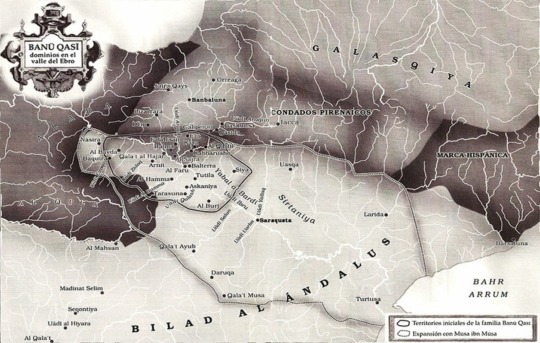


(* Some towns and cities that already existed are not in this maps, but probably were not included in the maps because maybe they're not relevant for the story, X, X, X )
Zaragoza (×) (although this one represents the Zaragoza from 11th century, due to the presence of the Palace of Aljaferia (×), although a watchtower existed since 9-10th centuries in that place, the Troubadour's Tower, that currently forms part of the palace)
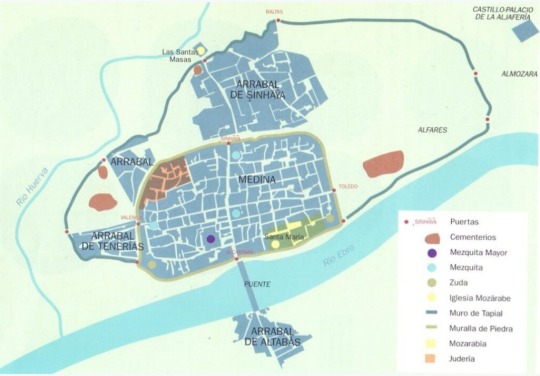
Tudela, but here's a video of Pamplona/Iruña
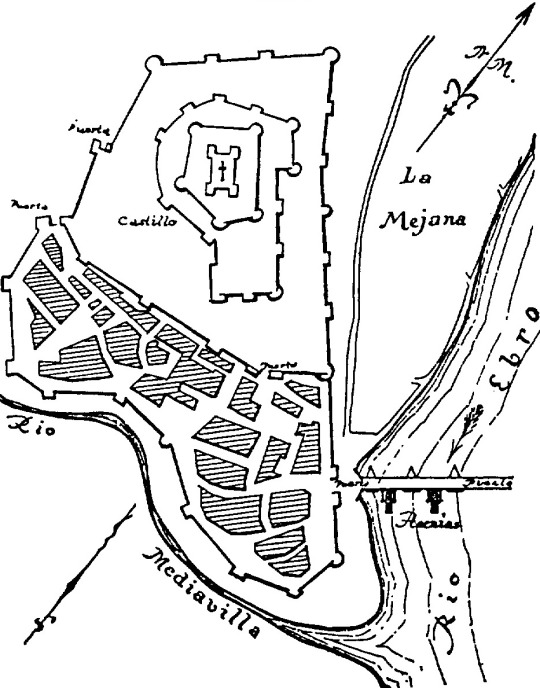
Córdoba (Here's a video with the current-day Alcázar and the Caliphal baths)
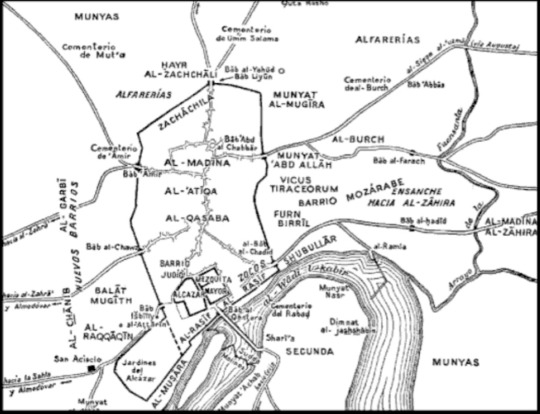
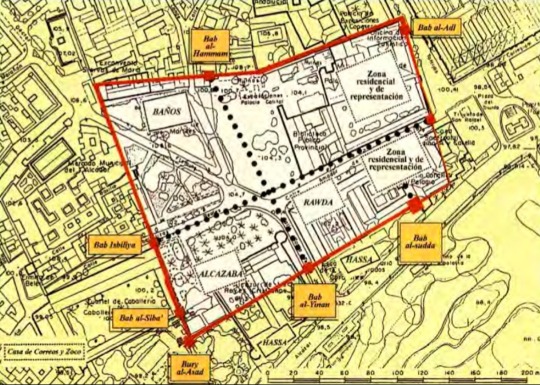

Toledo
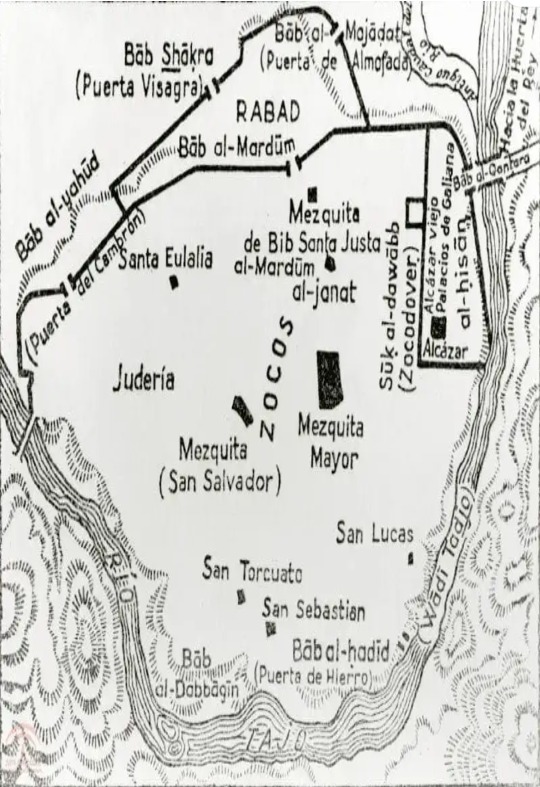
Alaba: Álava
Al Bayda, Albayda: Albelda
Al Burj: Borja
Al Busherat: Las Alpujarras
Al Faru: Alfaro
Al Garb: 'the west', Algarve
Al Hamma: Alhama
Al Hamma: site that corresponds to the current Baños de Fitero
Al Hamra: 'the red', the Alhambra of Granada
Al Lura: Álora
Al Maghrib: current Maghreb area, Morocco, Algeria and Mauritania
Al Mahdiyya: capital of the Fatimid Caliphate founded by Al Mahdi
Al Mariya: Almería
Al Mahsan: Almazán
Al Mudawar: Almudévar
Al Munastir: Almonacid
Al Qala't: Alcalá de Henares
Al Qāhira: Cairo
Al Qastil: Carcastillo or Murillo el Fruto
Al Qila: Castile
Al Qulaiya: Alcolea
Al Qubba: Talavera
Al Rawda: one of the interior gardens of the alcazar of Córdoba, where most of the emirs were buried
Al Sarqiyya: Axarquía, in Granada
Al Xaraf: Aljarafe
Al Jazira: Algeciras
Almunya de Aisha: Muniesa
Al Sajra: Azagra
Antaqira: Antequera
Arnit: Arnedo
Aryiduna: Archidona
Askaniya: Cascante
Asturqa: Astorga
Asnad:Cenes
Astīban: fortress located in the current-day Alhambra
Aura: Fortress next to Barcelona, possibly in present-day Valldaura
Aybar: Aibar
Bab al Qantara: the Bridge Gate, in Córdoba, also known as Bab as-Sudda or the Azud Gate
Baghdad: capital of the Abbasid emirate
Bagúh: Priego
Bahr Algarbí: Atlantic Ocean
Bahr Arrum: Mediterranean sea
Balaga: Balager
Balma: place located on the left bank of the Ebro river next to Calahorra, it may correspond to the town of San Adrián
Balansiya: Valencia
Balterra: Valtierra
Bambaluna: Pampiluna, Pamplona
Banu Basir: Benameji
Baquira: Viguera
Barbitaniya: región of Sobrarbe, that included Jaca, Barbastro and Boltaña
Barsaluna: Barcelona
Baskunsa: place name that would correspond to the fortress of Rocaforte, which after the Reconquest, it would give to the current Sangüesa, located at the foot of this valley
Batalyus: Badajoz
Barbastur: Barbastro
Bayanna: Baena
Bayāna: Pechina, important trading city of the Mediterranean sea, replaced by the port of Almería
Basta: Baza
Bilad al Ándalus: Hispania
Bulāy: Poley, Aguilar de la Frontera
Burbaster: Bobastro, Umar ibn Hafsún's shelter
Cantabria: mountain range that borders river Ebro by the north, next to Logroño
Castro Muros: San Esteban de Gormaz
Dar al Islam: the lands of Islam
Dar al Rahn: the House of Hostages, in Córdoba
Daniya: Denia
Daruqa: Daroca
Deio: Monjardín
Dus Amantis: the Rock of the Lovers
Falah'san: Falces
Fās: Fez, capital of the Idrisi emirate
Finyāna: Fiñans
Galaskiya: Land of the galaskiyun, the gascons
Galipenzo: Gallipienzo
Garnata: Granada
Girunda: Girona
Hardaris: Ardales
Hisn Asar: Iznájar
Hisn Qámara: castle of uncertain location, near Colmenar and Casabermeja, in the province of Málaga
Hisn Qastuluna: the ancient Roman city Cástulo, in Jaén
Iacca: Jaca
Ifriqiya: Tunisia
Ilbira: Elvira, next to Granada, capital of the distrit with the same name.
Isbāniyā: Christian chroniclers called the peninsula as a whole Hispania. For the Arabs, Al Ándalus is only the land dominated by Islam. They call the Christian land by the name of their kingdoms, and the term Isbāniyā is reserved for the entire peninsula, although it is rarely used.
Ishbiliya: Sevilla
Istiba: Estepa
Istiya: Écija
Kabbaruso: Caparroso
Kara: Santacara
Larida: Lleida
Ledena: Liédena
Leqant: Fuente de Cantos
Liyun: León
Lizarrara: Estella-Lizarra
Madinat Selim: Medinaceli
Madinat al Faray: Guadalajara
Malaqa: Málaga
Mārida: Mérida
Martus: Martos
Milīla: Melilla
Millas: Mijas
Muish: Muez
Munt Sun: Monzón
Munt Liyūn: Monteleón
Mursiya: Murcia, also known as Tudmir (this name comes from the Visigothic count Teodomiro, who ruled it by the time the Muslims arrived to the Peninsula)
Nasira: Nájera
Niebla: District that corresponds to the current-day province of Huelva
Orreaga: mountains of Ibañeta or Roncesvalles
Ossa: Huesa del Común
Qabra: Cabra
Qabtil: Isla Menor (Sevilla)
Qadis: Cádiz
Qala't al Hajar/Qalahurra: Calahorra
Qala't al Hans: Alange
Qala't Gazuan: Alcalá de Guadaira
Qala't Ayub: Calatayud
Qala't Musa: Calamocha
Qala't Rabah: Calatrava
Qarmuna: Carmona
Qarqar: Cárcar
Qasida: Cáseda
Qarcastil: Carcastillo
Qasr Bunayra: Casarabonela
Qayrawán: Kairuán, capital of Ifriqiya, current-day Tunis
Quluniya: Clunia
Qumaris: Comares
Quriya: Coria del Río
Qurtuba: Córdoba
Qustantaniyeh: Constantinople
Qutanda: Cutanda
Raya: district that corresponds to the province of Málaga
Rasif: A promenade in Córdoba that ran along the right bank of the Guadalquivir river
Resa: fortress located on the banks of the Ebro, near the mouth of the river Arga
River Eiroca: River Iregua
River Iberus*: River Ebro
*the Iberian peninsula takes its name from the river Iberus/Ibero, the river Ebro
Rumiya: Rome
Sabta: Ceuta
Salubāniya: Salobreña
Santabariyya: Santaver, Muslim district that corresponds to the province of Cuenca
Saqunda: village in the suburb of Córdoba, on the left bank of the Guadalquivir river
Sajra Qays: Qays rock, fortress located near the current-day town of Huarte Araquil, in the Rock of Echauri, northwest of Pamplona
Saraqusta: Zaragoza
Seqontiya: Sigüenza
Siduna: Medina Sidonia
Sirtaniya: La Cerretania, in the Aragonese area of the Pyrenees, around the valleys of the Gállego and Cinca rivers. This denomination disappears from the sources from the 10th century, when the County of Aragon appears
Siya: Ejea de los Caballeros
Suhayl: Fuengirola
Sumuntān: Somontín
Tahert: city in the north of Africa, in Algeria
Tahust: Tauste
Takurunna: one of the corias of Al Andalus, with capital in Ronda
Tarraquna: Tarragona
Talyayra: fortress located below Bobastro, over the Guadalhorce river.
Tarasuna: Tarazona
Tāy^ula: Tíjola
Tulaytula: Toledo
Turtusa: Tortosa
Tutila: Tudela
Uādi al Hamma: River Alhama
Uādi al Hiyara: Guadalajara. At first, the name of rhe city was Madinat al Faray, but later it adopted the old name of the river Henares
Uādi al Jurs: River Guadalhorce
Uādi al Kabir: River Guadalquivir, 'the big river'
Uādi al Walid: Valladolid
Uādi Anna: River Guadiana
Uādi Aragun: River Aragon
Uādi Aruad: River Arga
Uādi Cinqa: River Cinca
Uādi Duwiro: River Duero
Uādi Eyroqa: River Iregua
Uādi Ibru: river Ebro, and by extension, the Ebro valley. (Also known as Uādi Abro or Uādi Ibro)
Uādi 'Ís: Guádix
Uādi Nahar: River Henares
Uādi Qalash: River Queiles
Uādi Salit: River Guadacelete
Uādi Salún: River Jalón
Uādi Sanyil: River Genil
Uādi Tadjo: River Tajo
Uādi Uarba: River Huerva
Uādi Urbiqo: River ��rbigo
Uādi Yallaq: River Gállego
Uādi Zidaq: River Cidacos
Uakhshama: Osma
Uasqa: Huesca
Ubbada: Úbeda
Uksunuba: Faro (Portugal)
Ulit: Olite
Uriyuwala: Orihuela
Ushbuna: Lisboa
Vareia: Varea
Welba: Huelva
Yabal al Bardi: Las Bardenas Reales, in Navarra
Yabal Sulayr: the mountains of the Sun, Sierra Nevada
Yabal Tariq: 'the mountain of Tariq', Gibraltar
Yayán: Jaén
Yilliqiya: Asturias (and by extension, Galicia). It's also writen as Illiqiya or Gilliqiya.
Yussana: Lucena
Etymology II Characters
2 notes
·
View notes
Text
DOWNLOAD MICROSOFT WIRELESS PCI ADAPTER MN 730 DRIVER
Download Type: http File Version: 012121597 File Size: 23 Mb File Name: microsoft wireless pci adapter mn 730 driver File Format: exe Date Added: 25 November, 2019 Downloads: 3726 Operating Systems: Windows NT/2000/XP/2003/2003/7/8/10 MacOS 10/X Uploader: Arnit Price: Free

What's New: - XML: Fixed intermittent crash when parsing AastraI Phone Directory objects. - Fixed self-healing web display issue. - RAID: Fixed(microsoft wireless pci adapter mn 730 driver Fixed) a bug where the drive bay status showed "Dismounted/Plugged" even if no drive was plugged in. - Fixes(microsoft wireless pci adapter mn 730 driver Fixes) Problem Device shown in ACPI WIN98 system info. - Fixed Power On By RTC function failed. - Fixed an issue that motion/sound detection recording in SD card will be stopping while change the File Format setting. - Fixed a(microsoft wireless pci adapter mn 730 driver a) bug where some settings were not recovered by restoring them from the USB memory device. - Fixed(microsoft wireless pci adapter mn 730 driver Fixed) the timing bug between wireless settings and USB modem detection. - Some DirectX 11 API games may experience an application crash when performing a task switch with Radeon Image Sharpening enabled. - Fixed Web filter issue. Users content: Re-name FW 4.4.0.2_B701 to v. Support iQoS (QoS by Application type) 3. Updates the Amazon Kindle and Audible application. Enable CPR support for CPU Ratio control. The latest version for AX4BS Pro Lovely Angel version (for Japanes only). Add global subtitle setting for video file that is never played. The speaker will search the environment for about 40 seconds, during which the LED is blinking red. Provides the Broadcom NetLink Ethernet NIC Driver 11.18c for Windows 2000, XP and XP64. Radeon Settings may experience an intermittent crash when accessing Radeon WattMan. This issue has been resolved; the relay ports will be open when power is applied. https://lionellowigmore.wixsite.com/files/post/download-lide-20-n670u-n676u-driver Supported OS: Microsoft Windows 8 Enterprise (64-bit) Windows 8.1/8/7/Vista 64-bit Windows 7 Windows 7 32-bit Windows 7 64-bit Windows Server 2003 64-bit Windows XP 32-bit Microsoft Windows 8.1 Enterprise (32-bit) Windows 2000 Microsoft Windows 8 Pro (32-bit) Notebook 8.1/8/7 32-bit Microsoft Windows 10 (64-bit) Windows XP 64-bit Windows 8.1 Microsoft Windows 10 (32-bit) Notebook 8.1/8/7 64-bit Windows 8 Microsoft Windows 8.1 Pro (64-bit) Windows Vista 64-bit Windows Server 2012 Windows 8.1/8/7/Vista 32-bit Microsoft Windows 8 Enterprise (32-bit) Windows 10 Microsoft Windows 8.1 (64-bit) Windows Server 2016 Windows Server 2012 R2 Windows Vista 32-bit Windows Server 2008 R2 Windows Server 2003 32-bit Microsoft Windows 8 Pro (64-bit) Microsoft Windows 8.1 Pro (32-bit) Microsoft Windows 8 (64-bit) Microsoft Windows 8 (32-bit) Windows Server 2008 Microsoft Windows 8.1 (32-bit) Microsoft Windows 8.1 Enterprise (64-bit) Searches: microsoft wireless pci adapter mn 730 driver for Microsoft Windows 8.1 Pro (32-bit); microsoft wireless pci adapter mn 730 MUJAH4106; microsoft wireless pci adapter mn 730 M41c; microsoft wireless pci adapter mn 730 driver for Microsoft Windows 8 Pro (32-bit); microsoft wireless pci adapter mn 730 driver for Windows Server 2003 64-bit; 730 microsoft mn pci wireless adapter driver; microsoft wireless pci adapter mn 730 M MU410-4; microsoft wireless pci adapter mn 730 Mce410-cet; microsoft wireless pci adapter mn 730 MU4106; microsoft wireless pci adapter mn 730 driver for Microsoft Windows 8.1 Enterprise (32-bit); microsoft wireless pci adapter mn 730 driver for Microsoft Windows 8.1 Enterprise (64-bit) Compatible Devices: Mouse; Hardware; Scanner; Tablet; Wifi adapter; Laptop To ensure the integrity of your download, please verify the checksum value. MD5: 5fa222b64da7f802256f15e50c12ddeb SHA1: de3b08115d2c124fdd4644ec0cacf43bb480c293 SHA-256: 61288eee39451883cb4528c43c20207ac04388ede4e4eef9bea8bc036d225b43
1 note
·
View note
Link
Το «Special Report» επανεκκίνησε για φέτος δυναμικά, προβάλλοντας την πρώτη τηλεοπτική συνέντευξη της Προέδρου της Δημοκρατίας, Αικατερίνης Σακελλαροπούλου. Και για την προσεχή εκπομπή, Τρίτη 20/10 στις 23:30 στον ΑΝΤ1, οι Τάσος Τέλλογλου, Αντώνης Φουρλής και Μαρία Σαράφογλου ετοίμασαν δυνατά θέματα. Το «Special Report» ερευνά το αυξανόμενο κύμα αμφισβήτησης της πανδημίας αλλά και των ιατρικών λύσεων που προτείνονται για την αντιμετώπισή της. Πόσοι Έλληνες θα έκαναν ένα εμβόλιο κατά του κορωνοϊού; Κατά πόσο θα μπορούσε ένα τέτοιο εμβόλιο να είναι υποχρεωτικό; Τι συζητάνε οι Έλληνες για τον κορωνοϊό στο διαδίκτυο; Η Σαράφογλου συνάντησε τους αρνητές του κορωνοϊού στις συγκεντρώσεις που κάνουν – παρά τις απαγορεύσεις – και τους θέτει τα ερωτήματα. Με τη βοήθεια ειδικών λοιμωξιολόγων, ερευνητών κοινής γνώμης, αλλά και ενός κορυφαίου συνταγματολόγου η εκπομπή ερευνά την επόμενη σύγκρουση που έρχεται στο «μέτωπο» της αμφισβήτησης του κορωνοϊού. Παράλληλα, ο Τάσος Τέλλογλου επιστρέφει με την κάμερα του «Special Report» στην Εύβοια, όπου καταστράφηκαν πάνω από 2.500 σπίτια, επιχειρήσεις και καλλιέργειες, και αναζητά τις αιτίες πίσω από την ανθρώπινη τραγωδία. Δείτε τα νέα της επικαιρότητας: Όλα τα νέα για την επικαιρότητα εδώ - ειδήσεις από την Ελλάδα
0 notes
Text
My Ideas for Dr. Neo Cortex's Family Members:
Father: Henry Cortex Mother: Eleanor Ratched-Cortex
Siblings (from youngest to oldest):
Maxwell Alder “Max” Cortex Zoe Amaryllis Cortex Mia Narcissa Cortex Ian Anthos Cortex Theodore Arnit “Ted” Cortex (twin) Thaddeus Cedar“Tad” Cortex (twin) May Clover Cortex Joy Camellia Cortex Ana Blossom Cortex (triplet) Ada Bluebell Cortex (triplet) Ava Begonia Cortex (triplet) Jed Clematis Cortex Deborah Primrose “Deb” Cortex Leo Fiorello Cortex James Willam “Jim” Cortex Ronald Cypress “Ron” Cortex Pamela Lavender “Pam” Cortex Beatrice Juniper “Bea” Cortex Gus Yarrow Cortex Abraham Oleander “Abe” Cortex
As you can see, all 20 of Cortex’s siblings have three-letter names, even if they’re just nicknames. Their parents named them this way on purpose. Also, they all have flower- and plant-related middle names because Cortex’s middle name is Periwinkle, which is the name of a flower. And yes, there is a flower called “William”.
I made Cortex’s mom’s maiden name “Ratched” after Nurse Ratched from “One Flew Over The Cuckoo’s Nest”. I’d like to think Cortex’s mother was just as cold and heartless, if only towards Cortex himself.
I’ll probably post profiles of all of these characters later, so stay tuned!
13 notes
·
View notes